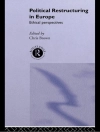Since 1945, what ‘conservative’ means has troubled intellectuals, politicians and parties in the United Kingdom and West Germany. In Britain conservatism was an accepted term of the political vocabulary, denoting a particular tradition of political thought and practice. In West Germany, by contrast, conservatism was a difficult concept for the young democracy to swallow. It carried a heavy antiliberal and antidemocratic burden and led people to question whether there was a place for conservatism within democratic culture after all.
The Guardians of Concepts scrutinizes the debates about conservatism in the UK and the Federal Republic of Germany from the late 1940s to the early 1980s. Informed by historical semantics, it conceives of conservatism as a flexible linguistic structure, and shows the importance of language for the self-understanding of many conservatives, who not by chance, have regarded themselves as the guardians of concepts. The intense national and transnational debates about the meaning of conservatism had far-reaching consequences and continue to influence politics today.
Tabla de materias
Acknowledgments
List of abbreviations
Introduction
Chapter 1. Conservatism and Toryism: Concepts of self-description in the political languages of conservatism in the United Kingdom
1.1.Conservatism, Toryism and the party: Determinants in conceptual formation since the late eighteenth century
1.2. New, progressive, modern: Conservatism and Toryism, 1945-1963
1.2.1. Striving towards the future: The delicate balance of the temporal dimensions and modern conservatism
1.2.2.Being conservative: Michael Oakeshott’s solitary voice in the 1950s
1.2.3. Committing to balance: Harold Macmillan and the middle way
1.2.4. The loss of legitimacy of modern conservatism in the early 1960s
1.3. A Conceptual-Political Gap and Alternatives to Fill it: Edward Heath and the crux of political language, 1964-1975
1.3.1. The Great Divide and managerial pragmatism
1.3.2 Critical minds and intellectual mobilization: Heath’s critics in the party and their focus on vocabulary
1.3.3. A Better Tomorrow: Prime Minister Heath and the collapse of a horizon of expectation
1.4. Strategies of conceptual politics: Thatcherism and its concepts of self-description, 1975-1979
1.4.1.A clear, coherent political philosophy: The claim to conceptual interpretative authority
1.4.2. An Opening to the Future: The realignment of temporal dimensions in Thatcherism
1.4.3. Right or Centre? Concepts of political orientation and the dichotomy of political language
Chapter 2. The Arduous Quest for Conservatism in the Federal Republic of Germany
2.1. Challenged by liberal democracy: The concept of conservatism in the early Federal Republic of Germany
2.1.1.Conservatism after the catastrophe: Determinants of conceptualization in the early post-war period
2.1.2. Silence and tentative conceptual definitions: Conservatism in the West German debates on the Weimar New Right
2.1.3. A self-confident appropriation: The German Party’s concept of conservatism
2.1.4. Conservative positions and the ChristianAbendland: The Abendland Movement
2.1.5. Between abashed silence and ambivalent thematization: Intellectual Interpretations of the concept of conservatism
2.2. Christian politics in secular times: Discourses of self-understanding in the CDU and CSU during the late 1950s and early 1960s
2.2.1. An Explosive Party Conference Speech: Eugen Gerstenmaier and Liberalism in the Union Parties
2.2.2. The Christian-Social Wing of the Union and the High C
2.2.3. Attempts at a conceptual compromise: Christian politics and conservatism
2.2.4. The Self-Image of a Christian Worldview Party
2.2.5. Politics in the style of the Union: Self-attributions and the structural principles of political language
2.3. ‘We carry concepts of concealed language around with us’: language loss, language criticism and conceptual offensives in the 1960s and 1970s
2.3.1. The loss of language in the Union of the 1960s and Strauß’ conceptual initiative
2.3.2. The Union parties’ language-policy offensive: Sematest and linguistic policy consulting in the 1970s
2.3.3. Intellectual language criticism with conservative aims
2.4. ‘1968’, 1969 and the reformulation of the political languages of conservatism
2.4.1. In a ‘struggle over naming’: intellectual conservatism in a liberal spirit
2.4.2. Right-wing instead of conservative: German continuities or the second variant on the concept of conservatism
2.4.3.Conservative parties? The linguistic-political challenge of the CDU and CSU
2.4.4.Parties of the centre: Conceptual deficits and the programmatic renewal of the Union
Chapter 3. Initial conclusions: Political languages of conservatism in comparison – conceptual divergences and structural similarities
Chapter 4. Entering into European conversation: CDU, CSU and the Conservative Party in their search for a common political language
4.1. A History of Mutual Acknowledgement. The Cooperation among the CDU, CSU and Conservative Party from the 1950s to the 1980s
4.2. Conservative Connections? CDU, CSU and the Conservative Party and the solution for conceptual predicaments in Europe
4.3. Antisocialist Agreement in 1970s Europe: Strauß, Thatcher and Kohl in their Struggle for Freedom
Conclusion
Glossary
Bibliography
Index
Sobre el autor
Martina Steber is Second Deputy Director of the Leibniz Institute for Contemporary History, Munich, and Professor of Modern History at the University of Augsburg. Beforehand she held positions at the German Historical Institute London, the University of Konstanz and the University of Wuppertal. Her publications include: Ethnische Gewissheiten. Die Ordnung des Regionalen im bayerischen Schwaben vom Kaiserreich bis zum NS-Regime (2010); Visions of Community in Nazi Germany. Social Engineering and Private Lives (ed. with B. Gotto, 2014); and Germany and ‘the West’: The History of a Modern Concept (ed. with R. Bavaj, 2015).












